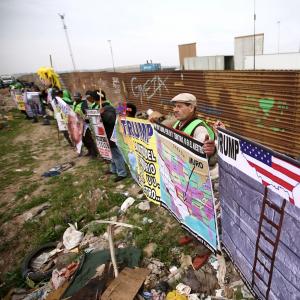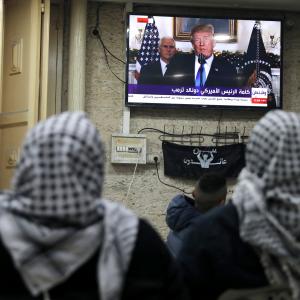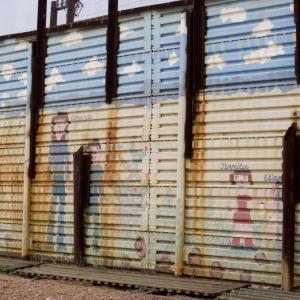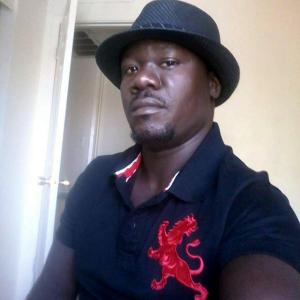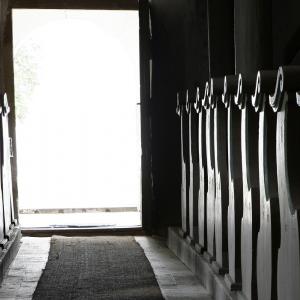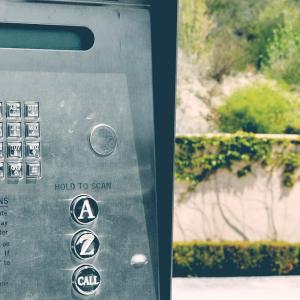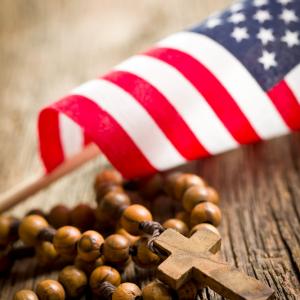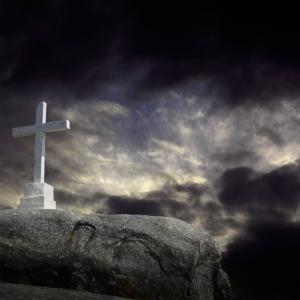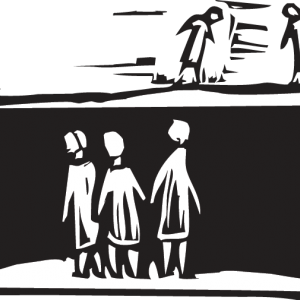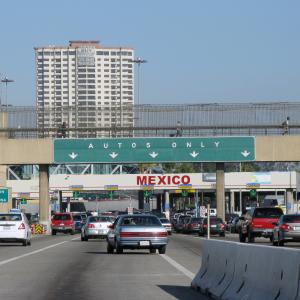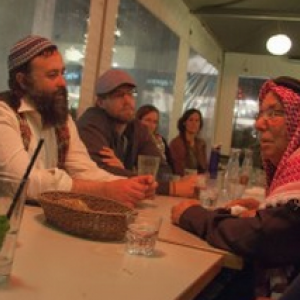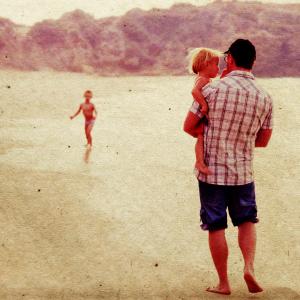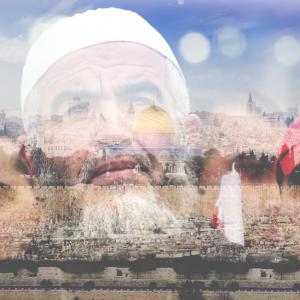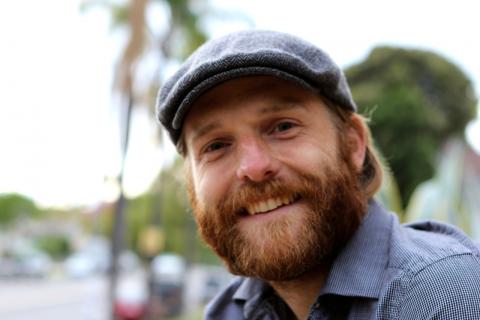
He writes for numerous publications including USAToday, Red Letter Christians, Sojourners, and RELEVANT, is a contributing author to multiple books and has written three himself; Mending the Divides: Creative Love in a Conflicted World, Thin Places: Six Postures for Creating and Practicing Missional Community and Teaching Through the Art of Storytelling. Jon regularly speaks at churches, universities and conferences and has a master’s degree from Fuller Theological Seminary in theology and ethics. He lives in San Diego with his wife, Jan, three daughters (Ruby, Rosie & Lou) and one son (Hank) where they co-lead an intentional Christian community seeking to live as a reconciling presence in their neighborhood of Golden Hill.
Find Jon at jonhuckins.net, Twitter, or Facebook.
Posts By This Author
The Wall, the President, and the People
President Trump, I personally invite you to also come down to the borderlands with me in Tijuana and San Diego and meet the people directly impacted by the stroke of your pen. I am a co-founding director of Global Immersion, and one of our primary organizational initiatives involves having cross-sector leaders from around the country come to the border to see the human face of immigration and build a set of tools for how to better care of the “stranger among us,” as my sacred text (the Bible) mandates.
We Need a Diplomacy of De-escalation. Trump’s Jerusalem Statement Is the Opposite
Peacemaking isn’t a passive withdrawal from conflict — it’s an intentional movement toward it with tools to understand, heal, and transform. It’s time for Christians across the U.S. to engage in this conflict in a helpful, curious way. I know there is a lot of confusion and complexity around this and, for the sake of my friends (Jews, Christians, and Muslims) in the region, as well as our collective wellbeing, I feel compelled to offer a few brief observations on today’s announcement by President Donald Trump on the U.S. embassy and the status of Jerusalem as the capitol.
Border Arrests Are Decreasing. But Has the U.S. ‘Solved’ the Immigration Crisis?
In light of these experiences and news of the reduced migrant arrests in March, here are some of the questions I’m asking and ones all Christians should consider: With the reduced movement across the border, am I celebrating what I perceive is best for my country or what is best for my human family? Do my national values conflict with my kingdom values?
‘I Love the U.S. But I Have an Expiration Date’
The Collateral Damage of Unjust Policies

Image via Nebojsa Markovic / Shutterstock
Real people, with real stories, and real families are trembling in fear for the future of their families and, in some cases, their own lives. For those of us who follow Jesus, our faith must inform our citizenship — not the inverse. It's time for us to ask better questions, seek deeper understanding and accompany our neighbors— whether local or global — who are navigating the scariest moments of their lives.
The Pipeline Continues. So Does the Resistance.

Image by Dark Sevier / Flickr.com
Today, President Donald Trump signed an executive action greenlighting the Dakota Access Pipeline, which had been halted to seek alternative routes. The original route, under Lake Oahe, would have threatened the Standing Rock Sioux’s drinking water and sacred lands.
A City in Pain: The Shooting Death of Alfred Olango
Those in leadership are tasked with navigating the complexities of yet another shooting investigation of an unarmed African-American man with justice and integrity. The mothers, sisters, brothers, and fathers in the community are tasked with lamenting the loss of their loved one who was crying for help, not death. It is in the midst of all this that the church must show up. If we are not an instrument of peace now, then when? Should we run into isolation? Should we cast judgment from afar? Should we shout the party line? No, we must lean in. We must listen. We must lament. We must leverage our influence for the flourishing of others.
Here's Why There's Still Hope for the American Evangelical Church
If I’m completely honest, I’ve been really discouraged as of late. A major source of my discouragement has been the way the American evangelical church (a tribe I have identified with for most of my life, so my critique and exhortation will be directed there) has chosen to engage the world in this season marked by division, violence, and trauma. Now, I admit I’m speaking in generalities, but rather than being the healing balm to society’s gaping wounds, we have often contributed to the bleeding by either withdrawing in fear or adding fuel to the violence.
Worshiping the Idol of Safety
I’m convicted that my desire to applaud this “security at any cost” rhetoric and policy is a temptation to worship the idol of safety. It is not something to be admired, it is something to be acknowledged, questioned, and repented of (turned away from). Worshiping the idol of safety greatly inhibits our ability to worship the crucified and risen Jesus.
Shrink Your World
Practicing Presence Amid Polarization
While there is no more important moment to be deeply engaged in the realities impacting our global family, there is also no more important moment to be fully present to the world that is pulsating right in front of us in our homes and on our streets.
There are currently dozens of national and global realities swirling around us that can cause us to fear, worry, and pour our precious energy and attention outward. Our smart phone notifications go off and we are once again a screen away from the other side of the globe or at the center of another partisan debate. What can be used as a critical asset in our global engagement quickly becomes the source of our paralysis and distances us from what is right in front of us.
Living 'Selma' in a 'Sniper' World

Edmund Pettus Bridge in Selma, Ala. James R. Martin / Shutterstock.com
We live in a culture that not only glorifies violence, but often celebrates its use against the “enemy" as the truest form of heroism and bravery. While I won’t get into the debate of whether violence is ever justified to preserve life (a much bigger conversation extending far beyond an 700-word post), I will say I’m deeply troubled by our assumption that violence is the only way to respond to a real or perceived threat.
To My 4 Kids, From Dad
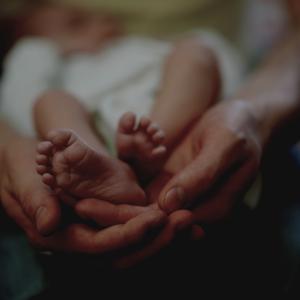
Image via Dmytro Vietrov/Shutterstock
After five days in the hospital, filled with overwhelming joy, paralyzing fear, and complete exhaustion in the wake of the birth of our twins, I finally found a moment to walk outside the florescent lights and sit under the bright moon. Sitting on a small patch of grass outside the hospital doors, the reality of being a father to four kids finally hit me. I was both overwhelmed and overjoyed by the gift and responsibility of raising four kids in a world so desperately in need of mustard seeds of hope that one day blossom into healing and beauty.
So as I sit in relative comfort and begin to dream big dreams for my kids, I am struck by the reality that most fathers around the globe are forced to welcome their kids into a world where there is no "ladder" to climb because it has been knocked out from under them by broken systems that are breaking people. A world where many kids are born into families fleeing violent persecution and being nursed on the trauma of war in battered refugee camps — places where the thought of hope is a distant second to simply fighting to survive. A world where one’s value is more closely associated with gender (male) than with the beautiful uniqueness inherent in every new life.
But this is also a world pregnant with possibilities. A world where former enemies move beyond their past, share tables, and begin to imagine a future together. A world where the blossoms of new life begin to sprout in the shadowy corners of forgotten neighborhoods. A world where the diversity of God’s kingdom begins to awaken our eyes and hearts to the new world God is making.
It is in this world — a world both beautiful and broken — that I offer this prayer over my four kids.
4 Tips for Following Jesus in Election Season
Well, here we are again. The season that seems to come around all too often and stick around far too long. Some of our dinner table dynamics are still trying to recover from "conversations” that percolated during the last election season and our “unfriend” counts have finally slowed.
So, how does the Jesus community live in this election season as a signpost of the kingdom rather than a pawn in a political power play?
Our Addiction to Busy
While I can make things happen, contribute to long-term movement, and rally folks around a vision, I can also overwork, form my identity around the things I do rather than who I am and, in the end, miss out on the sacredness of being present in the beautiful mundane of everyday.
This is an important realization (and a hard one!) and I’m having to do a little extra evaluation of it in my current season of life with nearly four kids, a non-profit, and a household that requires the attention of a Fortune 500 CEO.
I was recently on a walk to the park with my girls Ruby (4) and Rosie (2). While I was distractedly responding to an email on my “smart” phone, I looked over and noticed that Rosie had fallen behind and was bent over staring at the ground. As I circled back around to speed her up, I noticed that she was looking at a crack in the sidewalk admiring the little twig that was sprouting between the concrete slabs.
For her, she wasn’t at all concerned about arriving at a destination, but about being fully present along the way. In this tiny twig, Rosie found beauty and she wasn’t about to miss it.
Why I’m Giving Up Peace for Lent
The violence of our world seems to be spiraling out of control. Every news outlet is filled with the latest tragedy and for many, the violence has struck closer to home than they ever imagined. Sadly, much of the violence is being done in the name of religion. Religion — at its best — is designed to be a conduit for right relationship. At it’s worst, used as a tool for manipulation and violence. While the former is certainly happening, the latter appears to be one step ahead at the moment.
If ever there were a time where the work of peacemaking seemed soft and unrealistic while proposing some kind of fairy tale future reality, it is now. If ever there were a time to set aside the way of reconciliation for the way of revenge, it is now. Peacemaking appears to be a royal waste of time reserved for the ignorant idealists.
Yet, if ever there were a time the exact opposite case could be made, it is now. In recent history, there has never been a time peacemaking is more necessary. In fact, the moment we deny the necessity for peacemaking, we deny the very mission of God and the vocation of God’s people. God’s work is peace — the holistic repair of relationship — and the vocation of God’s people. We aren’t pawns in a divine drama that will end in an atomic holocaust allowing us to apathetically put our hands up in resignation because “everything is going to hell.” No, the Jesus Community is to announce the reality of God’s kingdom and participate in God’s activity of making all things new. And not just in some future world, but NOW.
Where do we start and how do we keep hope in a world of war?
We need to give up peace for Lent.
The Tragedy of Self-Appointed Prophets
The world is swirling with issues.
Picking up my phone and opening my news app each morning is being met with more and more dread each day.
When something hits the news, it is fascinating to watch people jump onto social media and begin “yelling" out their answers for how to heal our broken systems.
Of course, there are almost always at least two completely different opinions for how these problems should be fixed, which typically leads to people drawing lines in the sand, picking their stance, and not budging. Relationships often fracture and a polarized a world gets more polarized, rendering it immobilized for the work of reconciliation.
Whether it’s on our Facebook page, Twitter feed, or around our table, I assume most of us can think of an interaction where this unhelpful and potentially destructive reality played out.
So, does this “yelling” of our opinions actually help heal the broken systems and the people whom those systems are breaking?
Three Barriers Hijacking Christians' Ability to Love Our 'Enemies'
In recent years, my family has navigated some rough patches: death, cancer treatments, open heart surgeries, chronic disease, etc. Now, I’m certain this isn’t everyone’s experience, but mine has been that in these times of trauma or tragedy, family comes together to stand with one another as we wrestle through life’s crap. We aren’t picking fights, we are crying on each other’s shoulders.
In recent months, our human family has been enduring an especially rough patch.
War.
Racism.
Suicide.
Deadly viruses.
Plane crashes.
Whether in remote villages or urban centers, few have been untouched (in some way) by the realities unfolding.
As I observe our corporate response to tragedy as a human family, and evaluate my own response in the midst of it, I have noticed something disturbing unfold. Rather than rally together as a family navigating a season of trauma, we have used this moment to divide, stir hatred and misunderstanding, point fingers, and more than anything, view those on the opposite side of an issue as less than human.
Deported: A View From the 'Other' Side
[Gilberto] shared about the man who had been deported at 51 years old after living in the U.S. for 50 years. Because this man’s parents came to the U.S. when he was 6 months old, he knew no other home than that of the U.S. When he landed in Tijuana, it not only felt like a foreign land, but he didn’t even know Spanish.
He shared about the U.S. military veteran who served in Iraq and Afghanistan but after serving his time in war zones, was deported to Mexico.
He shared about the man who had recently been deported and was now desperately trying to return to his wife and young children in the U.S.
With each story, the layers of isolation, dehumanization, and misunderstanding began to be peeled back. We had all heard the stories of deportation in the headlines, but none of us had come face to face with the humans behind the story.
Mesmerized by this sage who cast such a strong aroma of Jesus, we asked, “What would you encourage us to say to our congregations regarding the plight of the immigrant?”
He quickly responded with words I’ll never forget:
“Tell them to read their Bibles. Jesus told us to care for three types of people: the orphan, the widow, and the stranger. It’s been 2,000 years and we’re still doing a pretty bad job.”
De-escalating Violence and the Human Story in Israel/Palestine
I was sitting in the airport the other day listening to yet another account of the current events unfolding in Israel and Palestine. Almost mechanically, the lips of the news anchor spilled out words like terrorists, extremist, escalating violence, detention, kidnapping, hatred, protest, etc. It was as though they were telling a story of some otherworldly reality that had virtually no human implications. It was all the stuff we are supposed to hear about the Middle East, so it successfully affirmed stereotypes, assumptions and prejudice.
Raising Girls In A World Where They Are Less Than Human
I have two daughters.
They are little spark plugs of utter joy and complete chaos. They make me laugh. They make me cry. They remind me to view the world through childlike wonder. They remind me that I am not what I do, but who I am. They teach me what selfless love actually looks like … every day … day after day … early morning after early morning … nasty crap diaper after nasty crap diaper. They make me realize how much I have to learn about parenting and our place in the world.
Most every night from the moment they were born, I have quietly held them in my arms or rested my hand on their backs while they sleep and prayed for them.
I pray for their continued breath. I pray for their development as little, unique human beings. I pray the Spirit of God to fill them and empower them. I pray the Lord’s Prayer over them. I pray for them to be protected from evil. I pray for them to love those who aren’t often loved. I pray for them to live confidently into who they have been created to be, free from the pressure of imposed reputation and expectation.
I pray for their past, present and future.
In learning to love these little girls, I began to ask more and more questions about the place of women in the world, in the church, and in everyday life.
Left Behind, Failed Peace, and the Human Implications of (Bad) Theology
Through my work with The Global Immersion Project, I have spent a significant amount of time over the years cultivating relationships among both Israelis and Palestinians as we partner together in cultivating a narrative of reconciliation. As is often the case when we approach a people or place with the hopes of being/bringing the needed change, I have been the one most changed by my friends and colleagues who reside in the Middle East. Behind so many of the subconscious stereotypes and prejudices I had acquired earlier in my life I began to experience the richness of friendship and brotherhood among people I had previously “known” only through the latest sound bite.
Something I have learned in the classroom of real life relationships with Jews, Christians, and Muslims in the Holy Land is that our theology in the West has direct implications for the everyday lives of those in the Middle East. Often ignoring the remarkable movements of peacemaking, reconciliation, and collaboration that are sprouting like mustard seeds of hope across the Holy Land, we often choose only to amplify of the violence, discord, and disintegration of the region.
